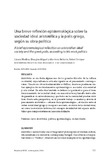| dc.rights.license | http://creativecommons.org/licenses/by-nc-sa/3.0/ve/ | |
| dc.contributor.author | Llanos M., Douglas Miguel | |
| dc.contributor.author | Martínez Bellorín, Rafael Enrique | |
| dc.date.accessioned | 2016-12-15T23:23:57Z | |
| dc.date.available | 2016-12-15T23:23:57Z | |
| dc.date.issued | 2016-01 | |
| dc.identifier.uri | http://www.saber.ula.ve/handle/123456789/42822 | |
| dc.description.abstract | Aristóteles es sin duda alguna uno de los grandes filósofos de la cultura occidental, cuya influencia está aún vigente en el pensamiento contemporáneo. Una de sus obras fundamentales es Política, donde se pueden encontrar ejemplos de sus fundamentos epistemológicos asociados a la sociedad y a la ciudad. En esta obra también se definen los parámetros para el buen funcionamiento de la ciudad ideal, con una estructura y tamaño finito a fin de garantizar su autosuficiencia y que todos en la comunidad puedan vivir bien. Desde esta perspectiva, en el presente trabajo se analiza y aborda el pensamiento aristotélico —a través de la epistemología—, el vínculo entre el orden social ideal griego y su espacio asociado, su visión de la ciudad ideal, así como la evolución histórica del concepto de infinitud del espacio aristotélico que siempre deviene en la noción de límite | es_VE |
| dc.language.iso | es | es_VE |
| dc.rights | info:eu-repo/semantics/openAccess | |
| dc.subject | Aristóteles | es_VE |
| dc.subject | Política | es_VE |
| dc.subject | Epistemología | es_VE |
| dc.subject | Ciudad | es_VE |
| dc.subject | Límite | es_VE |
| dc.title | Una breve reflexión epistemológica sobre la sociedad ideal aristotélica y la polis griega, según su obra política | es_VE |
| dc.title.alternative | A brief epistemological reflection on aristotelian ideal society and the greek polis, according to his work Politics | es_VE |
| dc.type | info:eu-repo/semantics/article | |
| dc.description.abstract1 | Aristotle is undoubtedly one of the greatest philosophers of western culture, whose influence is current in contemporary thought. One of his most important works is “Politics”, where it can be found examples of his epistemological notions associated with the Greek society and the city. This work also defines the parameters for the proper functioning of the ideal city, which finite size and structure was supposed to ensure self-sufficiency and well living for everyone in the community. From this perspective, this paper analyzes and discusses Aristotelian thought and epistemology, the link between the Greek ideal social order and its associated spaces, his vision of the ideal city and the historical evolution of the concept of Aristotelian infinity of space that always turns into the notion of limit. | es_VE |
| dc.description.colacion | 151-167 | es_VE |
| dc.description.email | dllanos@usb.ve | es_VE |
| dc.description.email | remartinezb@usb.ve; remartinezb@yahoo.com | es_VE |
| dc.description.frecuencia | Semestral | |
| dc.publisher.pais | Venezuela | es_VE |
| dc.subject.centroinvestigacion | Centro Iberoamericano de Estudios Provinciales y Locales (CIEPROL) | |
| dc.subject.facultad | Facultad de Ciencias Jurídicas y Políticas | es_VE |
| dc.subject.institucion | Universidad de Los Andes | es_VE |
| dc.subject.keywords | Aristotle | es_VE |
| dc.subject.keywords | Politics | es_VE |
| dc.subject.keywords | Epistemology | es_VE |
| dc.subject.keywords | City | es_VE |
| dc.subject.keywords | Limit | es_VE |
| dc.subject.publicacionelectronica | Provincia | |
| dc.subject.seccion | Revista Provincia: Artículos | es_VE |
| dc.subject.thematiccategory | Ciencias Económicas y Sociales | es_VE |
| dc.subject.tipo | Revistas | es_VE |
| dc.type.media | Texto | es_VE |


